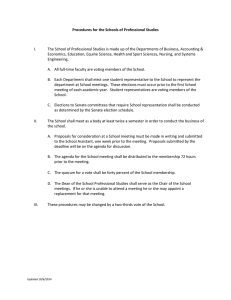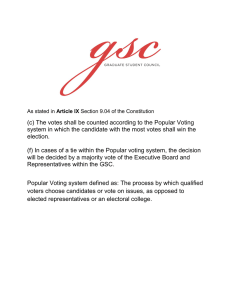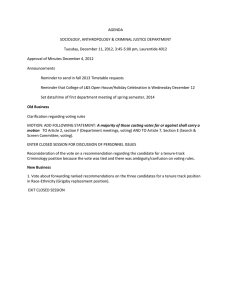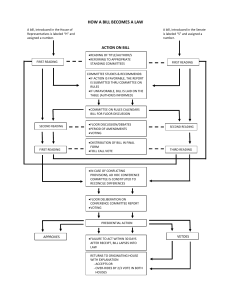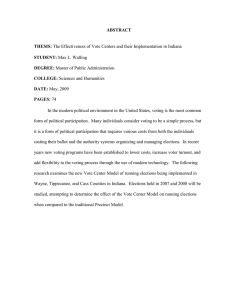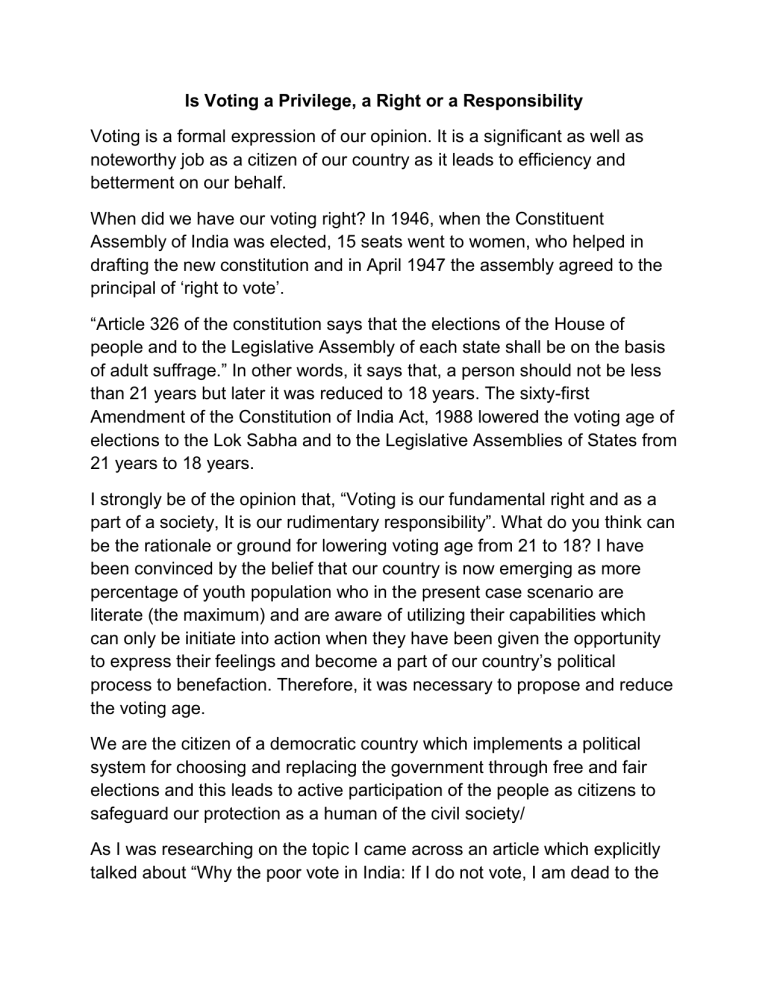
Is Voting a Privilege, a Right or a Responsibility Voting is a formal expression of our opinion. It is a significant as well as noteworthy job as a citizen of our country as it leads to efficiency and betterment on our behalf. When did we have our voting right? In 1946, when the Constituent Assembly of India was elected, 15 seats went to women, who helped in drafting the new constitution and in April 1947 the assembly agreed to the principal of ‘right to vote’. “Article 326 of the constitution says that the elections of the House of people and to the Legislative Assembly of each state shall be on the basis of adult suffrage.” In other words, it says that, a person should not be less than 21 years but later it was reduced to 18 years. The sixty-first Amendment of the Constitution of India Act, 1988 lowered the voting age of elections to the Lok Sabha and to the Legislative Assemblies of States from 21 years to 18 years. I strongly be of the opinion that, “Voting is our fundamental right and as a part of a society, It is our rudimentary responsibility”. What do you think can be the rationale or ground for lowering voting age from 21 to 18? I have been convinced by the belief that our country is now emerging as more percentage of youth population who in the present case scenario are literate (the maximum) and are aware of utilizing their capabilities which can only be initiate into action when they have been given the opportunity to express their feelings and become a part of our country’s political process to benefaction. Therefore, it was necessary to propose and reduce the voting age. We are the citizen of a democratic country which implements a political system for choosing and replacing the government through free and fair elections and this leads to active participation of the people as citizens to safeguard our protection as a human of the civil society/ As I was researching on the topic I came across an article which explicitly talked about “Why the poor vote in India: If I do not vote, I am dead to the state.” It makes me engrossed and I further did exploration and the consequence was something which I had already expected and the subject which I had been contemplating a lot about. Research in India between Lower, middle, and upper class show different outcomes. The lower class turns out to vote because they feel they should be doing so whereas the non-poor the greatest of them vote as they expect material benefits. As per the case study founded by BBC, India is an emerging and developing (EDC) found in Southern Asia and one of the world’s largest democracy and fastest growing economies in the world. According to the estimate provide in 2020, it had grown to become the fifth-largest economy and it has been predicted that it will be the third largest economy in the world by 2025 after China and USA. However, despite its rapid growth , Human development Index(HDI) places India 136th out of 187 countries with 25% of the population still living on less than 1$(US Dollar) a day. This is something where our country lacks. With such big achievements and on the top where In our country the total authorized strength of 180IAS officers are selected every year who have been guiding our State government and Central Ministers who need to oversee the expenditure and policy making and who cannot be put forward to manage the prominent tasks without the approval. Voting is our fundamental responsibility as a part of the citizen of the largest democracy in the world. Many people ignore because they do not believe this will cause them any benefit because the mentality which is the root cause and this needs to be corrected. The government needs to work for the welfare of their citizens and take care of their essential necessities. Poverty needs to be taken care of with proper measures, but as a citizen it is our duty to select the best candidate which we think will suit well and who is a person of integrity and honesty. Voter engagement is the critical and crucial part because it not only empowers the communities but also helps us in accomplishing our missions. When we vote it tends out to bring better health prospects, effective advocacy and many more advantages. “It’s good for you”. Our vote matters, research shows that people who do not vote regularly or who are younger and being ignorant about it have different viewpoints and perspectives than frequent voters on a variations of public policies. In the conclusion, when we regard voting as a privilege, it is much more than a liberty. When we say, “Education is a right, not a privilege “; Likewise It goes for voting as well. It is our fundamental right and our preeminent responsibility.
